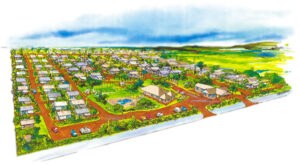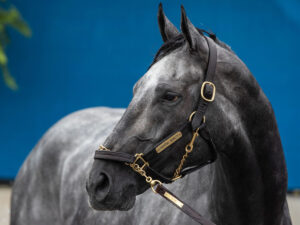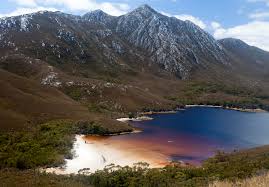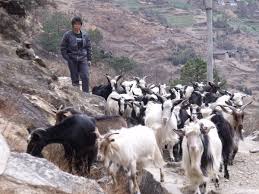After another 100 days I hope the world will have the same hope in Biden that it does now after the first 100 days. Having survived the four years of President Trump with all his mimicry of Batman’s enemies, it is good to have Bruce Wayne alias Joe Biden back. Sorry, so sorry I mistook your disguise as the doddering anziano, but your treatment of Anita Hill can never be disguised or forgiven because you begat Clarence Thomas, one of the great catastrophes of modern America.
Sometimes He gets it Right
Anonymouse 
It was May and then June last year that this Blog started to advocate for custom built quarantine facilities. One of the Blog’s mates thought it would be too expensive, and in any event the hotel industry had near empty facilities desperately in search of customers, so hotel quarantine was born. People returning from overseas fitted the bill for the missing customers, but viral outbreaks from these hotels have sporadically occurred. However, use of such facilities has also produced lessons – all of which can be applied to the adaptation of or construction of bespoke quarantine facilities in each State near ports of entry.
The Federal Government seems to be able to wrap its collective mind around all sorts of spending needs – defence spending seems to be a bottomless pit with an endless time frame. However, when the matter of defence is against an invisible foe, with so many tricks in its RNA, then Government seems not able to grasp the enormity of the problem and has sat on its hands for 12 months now apparently wishing it would all go away. COVID-19 will persist, with no idea when it will be conquered. At the same time, the social links between countries will be irrevocably changed.
Quarantine facilities require their own expertise and one of the various expertises needed is to ensure the rapid construction with best practice observed. That is why hard-nosed visionaries such as the Wagners in Queensland who were asked by that Government to prepare a plan, should be taken seriously; their Toowoomba airport venture should be sufficient proof as to their competence and ingenuity.
But in true Australian style, Government asks for a report. Jane Halton’s report was adequate in that she articulated the obvious – a national quarantine capacity – although it’s hard to see that recommendation, together with a collection of documentation, to be worth the alleged $118,000 it cost. The Report nevertheless provides the weasel words for the Government to ignore the positive parts of the report. For instance, the Halton pronouncement set out such a situation for the “Commonwealth Weasel”.
States and Territories should now consider their hotel quarantine operations in line with the features of good practice and make adjustments where necessary to meet these baselines. Noting issues about scalability and the specialised nature of the workforce required to implement hotel quarantine, States and Territories should also investigate establishing standing arrangements with AUSMAT in the event of the need to scale up operations quickly.
Stripping out the verbiage, of which there is plenty, the recommendation is to get a national system of quarantine, with agreed standards and scalable capacity. Too much to ask that our Federal and State Governments behave like grownups and just do this? The Federal Government’s admissions about quarantine in relation to returnees from India demonstrate the scale of the problem.
How long ago did Halton write her report?

The Inglenooks of Age
When I was a young doctor, elderly patients who presented in hospital, with apparently uninteresting symptoms and signs, besides being old, were called “old sloughs”. Now I have reached that “old slough” age, it just confirms how offensive that description was. Even then I recoiled from the dismissive way hospitals were places where these patients were admitted. Care was a secondary consideration. Therefore, old people when there was considered nothing more could be done, were left in a bed with minimal attention until they could be moved to a geriatric hospital, which was one step before the nursing home.
One case stood out when I was reviewing some of these older people in hospital. It was at a time before the specialty of geriatrics had been carved away from general medicine and general practice. In Victoria there were geriatric hospitals; later I received a more detailed insight into such care when I had to run the rehabilitation unit at one of the large teaching hospitals in Melbourne and later still spent time reviewing facilities when I was responsible for certain sectors of community aged care.
I stopped at the bed of an elderly lady who had been classified as suffering from dementia. I reviewed her charts and there, on her drug charts, was a nightly dose of Relaxa-tabs. She had been taking these for years and the order seemed not to have been changed. Naturally, with the dose prescribed, she would sleep, but I was taken aback by the quantity.

Relaxa-tabs contained bromine and so, out of curiosity, I ordered a serum bromine. When the result came back it showed her serum bromine was at toxic levels and clearly explained her apparent dementia.
The tablets were stopped at the time of the test, and once the serum level was known treatment was instituted to flush the bromine out of her system. Over the next fortnight her mental state improved to such an extent that I cannot remember whether she went home directly or had a staged return to a more normal living. The demented state cleared – I know that much.
To me it was a salutary lesson in labels, especially now I am of that age. Bromine in not the problem it was in the past as it has been removed from reputable pharmaceuticals. I have read that in the USA it is licensed to be added to the water supply of naval ships and oil rigs, as in addition to having sedative properties, it also allegedly dampens the male libido. I grew up, myth or not, believing that bromine was added to the tea of soldiers for such an effect.
You can have as many government inquiries into aged care as you like, but society has passed you by when you strike 80. The elderly with money can have their care softened by the cushioning effect of their money. I had an aunt who lived for her last years in a very plush nursing home, but even in that home, it was evident how many of the staff were recent immigrants, particularly from the Philippines and Nepal.
Yet neglect remains the headline for much that goes on in the aged care sector. The stories on the one hand of the Greek Orthodox Church demanding its nursing homes pay a tithe so the archbishop can have a wardrobe of fancy raiment or, on the other hand, of nursing home owners who live lavish lifestyles, complete with the signature matching yellow Lamborghinis, running nursing homes with minimum standards of care. I well remember the whole fiasco of Bronwyn Bishop’s stewardship 20 years ago when she was the Minister responsible for defending the use of kerosene baths in nursing homes Nothing much has changed, except perhaps the kerosene.
The exploitative areas of the nursing home industry should be shut down. When Governments crab away from such a drastic solution, they tacitly agree that the immensity of the problem of nursing home care requires not only more but also better trained resources in a coordinated environment and regulatory unification between the sectors – and Governments keep saying that, but effectively do nothing about solving the problem. It is ridiculous for the Commonwealth to be running the aged care sector and the States the public hospitals, when it should be the one sector.
As indicated above, I have been involved at various times of my professional career with the aged care sector, and it is a no brainer. There should be a single system, because age is a continual wave eventually crashing on the shores of death. At present, the method of distribution of health care is via aged care packages, depending on the funding source floating on the top of the wave. Quality is incidental.
There is a philosophy with certain government sources of shovelling out the cash – job done – but what about quality and outcome? To some bureaucrats that requires actual work, collection of data and, given the reigning politicians suppress as much information as possible, they may argue what is the point?
Political announcements are all about input and the immeasurable glorious future where the recipients of such input are chewing lotus leaves – or their gums. Who needs data, especially when this is the third or fourth time the same announcement of government largesse has been made? To make the point, sometimes irony is the best way to highlight the problem, especially when the government itself is the very epitome of irony when it says, “We are taking the matter very seriously.”
The other public problem is the lack of an articulate advocate for reform on behalf of aged care residents. If you look at the vast array of those who appear on the media, there are none who regularly appear when the topic moves onto the way to actually improve the lot of the aged. The last woman of consequence to appear regularly on a panel show and make an impact by clearly showing that age was not automatically the gateway to dementia was Margaret Scott, the Tasmanian poet, who was a regular guest on Good News Week in the 1990s.
It is mainly a variety of social workers and health professionals who are some way away from being aged, often well skilled in the vocabulary of “shock and horror show”, but stopping short of doing anything.
There is the vaudeville act that the ABC has twice arranged by mixing the very old with the very young. This concept was aired first on the BBC and, given the COVID-19 pandemic, the ABC have been venturing into perilous territory, but it is assumed everybody involved has been “dry cleaned”. The concept is very interesting, but not just as sporadic entertainment. After all, grandparents looking after their grandchildren has been around for a long time, just ask the Indigenous community. I am just not aware of any program which seriously looks at the benefit of those arrangements long term and whether a program such as the ABC is airing is demonstrating anything sustainable or generalisable.
There is also that myth about 70 being the new 50. However, it is illusionary. The general improvement in the welfare of the community has improved. Too many in the years after the “new 50” start to die in a manner not befitting of a reborn generation 20 years younger.
The problem with age is invalidism and the daily humiliations that accompany it. I am reminded of the words of a young woman with motor neurone disease who said she most feared the time she could not wipe her bottom – to her this represented a turning point. Don’t just be appalled about the frail and elderly dealing with such daily humiliations. Demand that every politician spend a week or two in community service looking after the aged and contemplating their own probable destination before they can pontificate about the problems of aged care. Although perhaps their pensions will be such that their choices will be much easier in the future.
The Drums are beating
This past weekend, Essential Quality came fourth in the Kentucky Derby at Churchill Downs. Louisville is the city in the middle of this blue grass country and Bourbon distilleries.

As the NYT has reported, pre-race talk among the racing fraternity was all about what Sheikh Mohammed’ al-Maktoum’s money has accomplished, and the fact that the same group completely ignored the international human rights scandal over the Sheikh’s role in the disappearance of Sheikha Latifa, one of his daughters.
But others are speaking up. A group of human rights lawyers and students at the University of Louisville filed a complaint with the Kentucky Horse Racing Commission, asking it to bar Sheikh Mohammed and thus Essential Quality from the Derby.
“The Horse Racing Commission must also use its authority to end his involvement in Kentucky horse racing, at least until Princess Latifa is free of captivity,” the complaint document insisted. The Kentucky Racing Commission went for the long blue grass; after all, the pervasive influence of the UAE ruler who pays the wages of a large segment of the racing industry not only in Kentucky but also across the world. In Australia where the racing industry has a disproportionate influence, one can only cringe when one hears our equine commentators falling over themselves to address “His Highness”.
Two weeks ago a panel of United Nations human rights experts, including members of a panel that deal with forced disappearances and violence against women, asked Dubai for proof that Sheikha Latifa was still alive and called for her immediate release.
“Evidence of life and assurances regarding her well-being are urgently required,” the U.N. analysts said. In recent years, videos have of Sheikha Latifa, saying she was imprisoned in a Dubai palace and afraid for her life. In a 2018 video she said, “her father only cares about himself and his ego.” In an ominous premonition, “I’m making this video because it could be the last video I make,” she said. She was last seen at a meal hosted by her father that the former Irish President and erstwhile defender of human rights, Mrs Mary Robinson attended. She later said she had been tricked into attending. Yet her excuses sounded lame in a report of the matter in the Irish Examiner when, in her attempt to rationalise the woman’s dire situation, she was reported to have said Sheika Latifa was said to have a bipolar disorder. I would say it was the least of the Sheika’s worries.
As widely reported, Sheikha Latifa hasn’t been seen in public since an attempt to escape in March 2018, when her Finnish personal trainer and a former French soldier joined forces to smuggle the Sheika aboard a boat, which was later boarded by armed Emirati commandos in Indian waters. Sheikha Latifa and her personal trainer, Tiina Jauhiainen, were captured at gunpoint, sedated and returned to Dubai, with Ms Jauhiainen released after a fortnight. No mention is made of the French soldier’s fate.
This is not the first time Sheikh Mohammed’s treatment of female family members generated outrage. Last year in Britain a judge found that he had abducted another daughter, Shamsa, off the streets of Cambridge in the UK in 2000, flew her by helicopter to France and then returned her to Dubai.
In addition, his youngest wife, Princess Haya, Mrs Robinson’s mate, has also left Dubai fearing for her life after she was subjected to a campaign of intimidation and harassment.
But then the Sheikh has 30 children from six wives. Given the attention being shown to women’s right in Australia, who will be the first to issue an invitation for Princess Latifa to visit Australia – if she hasn’t been killed already by Godolphin Blue.

Tasmania – the place where it counts
Each of five electorates are called divisions. Each division has approximately the same number of electors. Voting for the House of Assembly is by a form of proportional representation using the single transferable vote (STV), known as the Hare-Clark electoral system. By having multiple members for each division, the voting intentions of the electors are more closely represented in the House of Assembly.
Since 1998, the quota for election in each division, after distribution of preferences, has been 16.7% (one-sixth). Under the preferential proportional voting system in place, the lowest-polling candidates are eliminated, and their votes distributed as preferences to the remaining candidates. If a candidate achieves a quota, their surplus votes are redistributed as preferences.
I was once elected to office by a similar system.
In this election Premier Gutwein in his Bass division nearly achieved three quotas. That is the way to do it, because once you reach the required number of votes, the surplus cascades to your fellow party members. If the level of this popularity for Gutwein had been translated across the other four division, he would have won in a landslide.
That is not how Tasmania works. Like Gaul, Tasmania is divided into three parts. Hobart in the south, Launceston in the north, and a conglomerate of towns on the north-west and west coast.
Hobart spreads westwards along the Derwent is a different constituency to Bass. Divided into Clark, where the Liberals struggled to gain a second seat and Franklin, where the Liberal and Labor Party gained two seats and Greens one, the electoral picture is far different in the other three constituencies of Lyons, Braddon and the Gutwein fortress of Bass.
Launceston, the overwhelming population centre of Bass, in fact is a much smaller electorate in geographical terms than the other two northern electorates. Yet it does include Flinders Island, where the Islanders are the closest living remnant of an Aboriginal race despite some residual controversy, where its purity left with the death of Truganini in 1878.
Devonport is the largest town in the north-west electorate of Braddon, but this electorate has a number of settlements ranging along the coast (plus King Island) and then extending down the Murchison Highway to the “mineral shield” settlements of Rosebery, Zeehan and Queenstown and the fishing and tourist settlement of Strahan lying as it does on Macquarie Harbour, the third largest in Australia, larger than Sydney Harbour.
Within Braddon are some of most extraordinary examples of untouched temperate rain forests, despite the efforts of successive Governments to destroy it in the name of jobs. Here, in one the most magnificent wilderness areas, despite a strong working class population the electorate is strongly Liberal – the heartland of Morrison populism. The Greens are the foe. Yet the south-west is the State’s unique flora and fauna Treasury.

Lyons, also a Liberal State electorally, is an amoeboid electorate which spreads its pseudopods from the east coast through the Midlands into Sheffield, a trendy watering hole just 22 kilometres south of Devonport which lies within Braddon on the north coast. Federally it has a Labor party member but in this State election it voted for the Liberal Party, a crossover trend which occurs in Tasmania; as does the number of Independent members of both State and Federal Parliament, which is not difficult to understand given how strong private politics are in Tasmania.
Last Saturday was the first time I had been in Tasmania when the State election had been held. The gracious concession speech of the Labor leader and the gruff laconic acceptance speech of the Premier contrasted with the predictable loquacity of the Greens leader given a post-election microphone. She unfortunately provided a strident tirade, and before turning her off, I had thought politics at the top here was refreshingly different. Not so.
For a population of about 550,000 with one in four of the population living in Hobart, it has 57 Federal and State politicians; and between 200 and 300 local councillors in the 29 municipalities (it was 79 when I first visited Tasmania).
Tasmania is grossly over-governed. Under the Australian constitution it is guaranteed five seats in the House of Representatives; and as with the US Senate each State has the same number, apart from the ACT and the Northern Territory.
Comparing Wyoming with a population slightly larger than Tasmania’s, it sends only one elected representative to Congress (out of 535). By contrast, Tasmania sends five elected members to the House of Representatives (out of 151).
Therefore, Federal Government policy towards Tasmania has traditionally been to fill the begging bowl and a tree not chopped down or a river not dammed or native species not exterminated have dogged policy considerations to the detriment of the State. It is private politics in its purest form. Take the health system: if Hobart gets A, Launceston and Burnie will want A too. It is the root cause of so much of Tasmanian problems – the inability to live with one another.
I was just perusing The Advocate, the paper of the north west. The number of football teams in the area is extraordinary, and as I have written elsewhere the antagonism between towns is often reflected on the football field and the closer the towns are to one another, the greater the antagonism and failure to work together. Thus, in terms of rationalising resources, this part of the State presents a problem in getting agreement to any public policy.
My contribution to this private politics, since I am a ratepayer, is the following ; first the gorse along the Zeehan-Strahan road needs to be eradicated before it consumes Tasmania, just as Queensland was threatened by the prickly pear infestation before the introduction of cactoblastis beetle. The other problem with gorse is that below its impenetrable prickly greenery it stores all its dead wood which can act as a fire accelerant.

Peruvian goat herders have been used in the USA to oversee goats which eat noxious weeds. Paradoxically if you do burn the gorse, then four to five years’ worth of goats feeding on it will eliminate gorse. Andean Peruvians are said to be the most reliable goat herders; apart from which, having a goat herd in the area will provide an industry and something for tourism. However, don’t let the goats become feral otherwise it’s another cane toad.
Secondly is to upgrade the Strahan airport to a level where it can receive planes as big as a 737. The latter is unlikely in the short term even thought it could be used for tourism in the south-west and would certainly open up the tourist market, especially with a rental car franchise. The longer term consideration is with climate change – inevitably the forests will dry out, and therefore there is a need on the west coast of Tasmania for the airstrip to be upgraded so water tankers can land instead of being based in Launceston or Hobart. For those with short memories, no one seriously believed the rainforest of the south coast of New South Wales could burn the way it did.
Then thirdly, more a suggestion than a demand, there is another industry which I find it strange that the Liberal Government has not promoted and that is dedicated quarantine facilities. I would not advocate Sarah Island in Macquarie Harbour, once a prison, but a properly constructed quarantine facility in Tasmania is certainly closer to Australia than Christmas Island.

But then the success of private politics depends on how determined and how committed one is for the long game. I wonder how well this is translated into the future administration of Tasmania.
Mouse Whisper
An unguarded comment?
As one of his colleagues recently remembered:
“30 years ago today, the wonderful C… H… died. Fabulous economist & mentor with unlimited time to talk. Friday drinks in his office often included Pichon Lalande, Lynch Bages & Chateau Talbot as he mulled over the next additions to his cellar. Great man; greatly missed.”
Different time – wrong look. Yet the connoisseur of lotus cuisine continues to be the role model for the current Canberra Elite.

